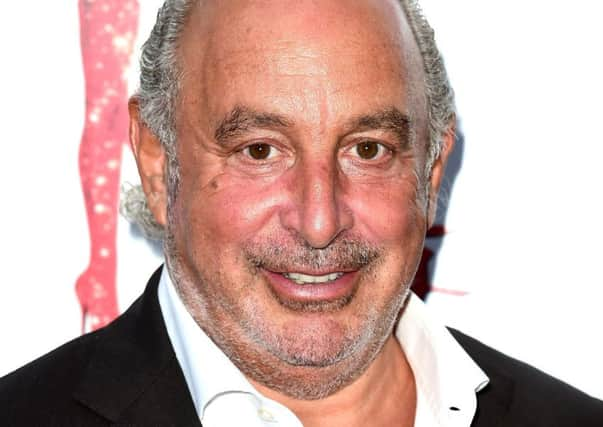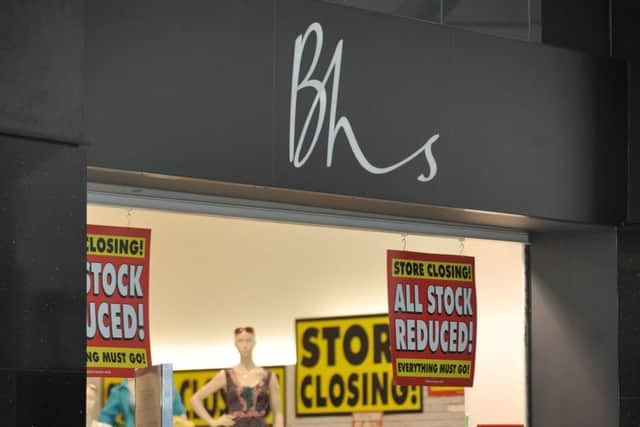'˜Unacceptable face of capitalism': How Philip Green mined money from BHS


In an excoriating joint report, two Commons select committees accused the entrepreneur of seeking to blame anyone but himself for the firm’s failure and said he has a “moral duty” to make a “large financial contribution” to the 20,000 pensioners facing substantial cuts to their benefits.


Advertisement
Hide AdAdvertisement
Hide AdWhile the committees were damning about Dominic Chappell, who bought BHS for £1, and the “directors, advisers and hangers-on” associated with the deal, they said that ultimate responsibility lay with Sir Philip.
Although his family had accrued “incredible wealth” from their early, profitable years of owning BHS - while paying little in tax - Sir Philip had failed to invest in the company and refused to address the “substantial and unsustainable deficit” in the pension fund.
The permatanned king of retail has seen his reputation - and potentially his knighthood - left in tatters by the collapse of BHS.


A bold, brash wheeler-dealer, he has amassed along with his wife, Lady Tina, a fortune that currently stands at £3.22 billion, according to the Sunday Times Rich List.
Advertisement
Hide AdAdvertisement
Hide AdThe vast majority of that fortune comes from the Arcadia retail empire, which he bought in 2002 and which controls brands including Topshop, Topman, Burton, Dorothy Perkins and Miss Selfridge.
That empire has allowed them to live life in the fast lane, a world of superyachts, apartments in Monaco and friendships with the likes of supermodel Kate Moss.
But it is BHS, which he bought in 2000, that has seen Sir Philip in the news - and in front of MPs - in recent months.
Its collapse in April left 11,000 people out of work and a £571 million black hole in its pensions fund.
Advertisement
Hide AdAdvertisement
Hide AdThe Topshop tycoon has come under fire for taking £400 million in dividends from BHS before selling the massively indebted firm for £1 in 2015 to businessman Dominic Chappell, who had no previous retail experience and had been declared bankrupt twice.
The two committees - Work and Pensions and Business, Innovation and Skills - said it was “inconceivable” Sir Philip had not realised Mr Chappell, a former bankrupt with no retail experience, was a “manifestly unsuitable” buyer and that he had “acted to conceal the true state of the BHS pension problem” from him.
The report - among the most scathing ever issued by a Commons committee - comes just days after the Cabinet Office disclosed that it was reviewing Sir Philip’s knighthood and will intensify the clamour for him to be stripped of the honour.
Frank Field, the chairman of the Commons Work and Pensions Committee, said: “One person, and one person alone, is ultimately responsible for the BHS disaster. His reputation as the king of retail lies in the ruins of BHS.
Advertisement
Hide AdAdvertisement
Hide Ad“His family took out of BHS ... a fortune beyond the dreams of avarice, and he’s still to make good his boast of ‘fixing’ the pension fund. What kind of man is it who can count his fortune in billions but does not know what decent behaviour is?”
The report concluded: “Sir Philip gave insufficient priority to the BHS pension scheme over an extended period. His failure to resolve its problems by now has contributed substantially to the demise of BHS.
“Sir Philip owes it to the BHS pensioners to find a resolution urgently. This will undoubtedly require him to make a large financial contribution. He has a moral duty to act, a duty which he acknowledges.”
When Sir Philip acquired BHS in 2000 for £200 million, the report said the company pension schemes were in surplus, but the high level of dividends paid out - more than double the after-tax profits of £208 million between 2002-04 - had left it weakened.
Advertisement
Hide AdAdvertisement
Hide AdAlthough he had been aware of the growing problem with the pension fund, he had resisted calls to deal with it, primarily because he did not want to reveal details of his past business dealings to the Pensions Regulator.
Faced with consistent losses, Sir Philip struggled to find a buyer for the company - in part because of the hole in the pension fund. Having rejected Paul Sutton - “a fraudster and a bankrupt” - he settled on his junior business associate, Mr Chappell.
In order to push the deal through, the committee said that regulatory concerns had been “circumvented”, advisers were “heavily incentivised” to make progress while background checks proved “inadequate”.
“Sir Philip Green drove the deal forward. He sought to sell a chain that had become a financial millstone and threatened his reputation,” the report said.
Advertisement
Hide AdAdvertisement
Hide Ad“He knew that Dominic Chappell was a wholly unsuitable purchaser but overlooked or made good each of Chappell’s shortcomings and proceeded with a rushed sale regardless.”
The deal was completed on March 11 2015 and 13 months later on April 26 2016, BHS went into administration leaving 11,000 employees facing an uncertain future.
Mr Chappell, described in the report as being “out of his depth” and “over-optimistic to point of arrogance”, was accused by the committees of having “had his hands in the till”, paying “lavish” rewards to himself and his associates while the company foundered.
The committees were scathing about the way the participants had each sought to blame each other, saying that at times their inquiry had resembled a “circular firing squad” with Sir Philip the “worst example”.
Advertisement
Hide AdAdvertisement
Hide Ad“The truth is that a large proportion of those who have got rich or richer off the back of BHS are to blame. Sir Philip Green, Dominic Chappell and their respective directors, advisers and hangers-on are all culpable,” the report said.
“The tragedy is that those who have lost out are the ordinary employees and pensioners. This is the unacceptable face of capitalism.”
David Gill, national officer of Usdaw, said: “This damning report outlines some extraordinary events and raises serious questions about corporate governance and business probity.
“The consequences of actions by a handful of people in the running of BHS are now being felt by the 11,000 hard-working, dedicated and loyal staff, with 20 stores closed last Saturday and another 30 due to close next Saturday.
Advertisement
Hide AdAdvertisement
Hide Ad“Many of these staff have given their whole working lives to the company and they must be feeling devastated and totally let down.
“Whilst we are aware that the administrators are continuing to seek a buyer, who will hopefully be able to secure the future of the staff in the remaining stores, we are increasingly concerned as time goes on.
“Sir Philip Green made two promises to BHS staff after the company went into administration.
“First, to offer employment within the Arcadia Group to the blameless, dedicated and loyal staff who suddenly find themselves unemployed.
Advertisement
Hide AdAdvertisement
Hide Ad“Second, to ‘sort’ the pension scheme and we wait to hear details of what he proposes. We need him to come good on these commitments as soon as possible.
“In the meantime we are providing the support, advice and representation our members require at this difficult time